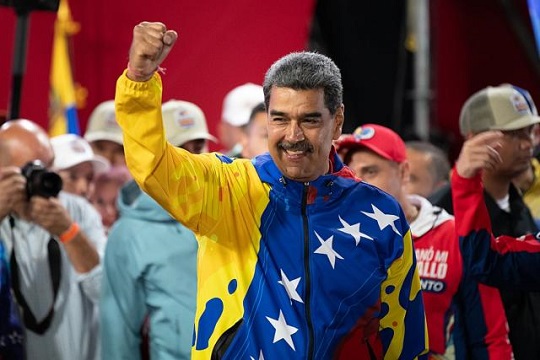Venezuela’s government and opposition are locked in a standoff after both sides claimed to have won the nation’s presidential election.
Millions in the long-suffering nation saw the vote as their best shot to end 25 years of single-party rule.
Foreign governments, including the US, held off recognising the results as election officials delayed releasing detailed vote tallies after proclaiming President Nicolas Maduro the winner with 51 per cent of the vote, to 44 per cent for retired diplomat Edmundo Gonzalez.
"Venezuelans and the entire world know what happened," Mr Gonzalez said.
US Secretary of State Antony Blinken said America has "serious concerns that the result announced does not reflect the will or the votes of the Venezuelan people."
Gabriel Boric, the leftist leader of Chile, said: "The Maduro regime should understand that the results it published are difficult to believe."
Meanwhile on the streets of Caracas, a mix of anger, tears and loud pot banging greeted the announcement of results by the Maduro-controlled National Electoral Council.
"This isn't possible," said Ayari Padron, wiping away tears. "This is a humiliation."
Voters lined up before dawn to cast ballots on Sunday, boosting the opposition's hopes it was about to break Mr Maduro's grip on power.
The result came as a shock to opposition members who had celebrated, online and outside a few voting centres, what they believed was a landslide victory for Mr Gonzalez.
Opposition leader Maria Corina Machado, who was blocked by the Maduro-controlled supreme court from running for any office for 15 year, said the margin of Mr Gonzalez's victory was "overwhelming," based on voting tallies the campaign received from representatives stationed at about 40 per cent of ballot boxes.
Former lawmaker Ms Machado was also blocked from joining the presidential race before newcomer Mr Gonzalez was chosen to represent the opposition party.
Authorities delayed releasing the results from each of the 30,000 polling booths nationwide, promising only to do so in the "coming hours," hampering attempts to verify the results.
After claiming to have won, Mr Maduro accused unidentified foreign enemies of trying to hack the voting system.
"This is not the first time that they have tried to violate the peace of the republic," he said to a few hundred supporters at the presidential palace. He provided no evidence to back the claim but promised "justice" for those who try to stir violence in Venezuela.
The election will have ripple effects throughout the Americas, with government opponents and supporters alike signalling their interest in joining the exodus of 7.7 million Venezuelans who have already left their homes for opportunities abroad should Mr Maduro win another six year term.
The opposition managed to line up behind a single candidate after years of intraparty divisions and election boycotts that torpedoed their ambitions to topple the ruling party.
Venezuela sits atop the world's largest proven oil reserves, and once boasted Latin America's most advanced economy.
But it entered into a free fall after Mr Maduro took the helm. Plummeting oil prices, widespread shortages and hyperinflation that soared past 130,000 per cent led to social unrest and then mass emigration.
Economic sanctions from the US seeking to force Mr Maduro from power after his 2018 reelection — which the US and dozens of other countries condemned as illegitimate — only deepened the crisis.
Evening Standard





